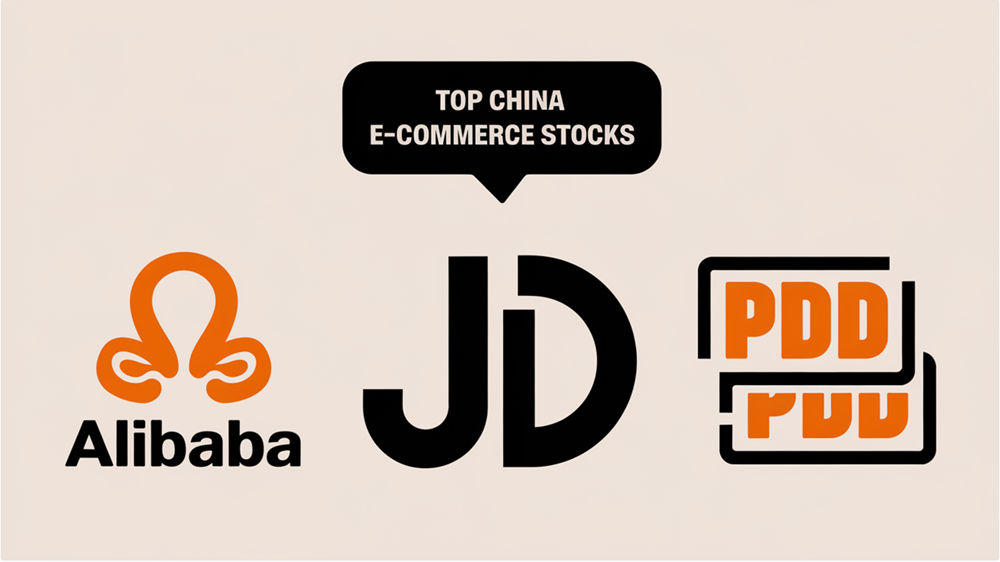MarketLens
Top China E-commerce Stocks: Alibaba vs JD vs PDD

Understanding the Business Models
Alibaba Group (BABA)
Alibaba, often likened to Amazon in the West, operates a marketplace model that connects buyers and sellers without holding inventory. This approach is exemplified by its flagship platforms, Taobao and Tmall, which boast over 800 million monthly active users. Alibaba’s strategy focuses on a broad range of product offerings and services, emphasizing user experience and product quality over low prices. The company recently merged its domestic and international e-commerce operations to create the Alibaba E-commerce Business Group, aiming to enhance synergies and streamline operations.
Key Features:
- Marketplace Model: Facilitates transactions between buyers and sellers.
- Diverse Offerings: Wide range of products and services.
- Strategic Merger: Integration of domestic and international operations to boost competitiveness.
JD.com (JD)
JD.com, China’s largest retailer, operates a direct sales model akin to Amazon’s, where it holds inventory and manages logistics. This model ensures product quality and timely delivery, a significant advantage in a market where trust and reliability are paramount. JD.com has been successful in areas like electronics sales, particularly during promotional events like Singles’ Day. The company benefits from government trade-in subsidies, which have bolstered its performance in recent months.
Key Features:
- Direct Sales Model: Holds inventory and manages logistics.
- Focus on Quality: Ensures product quality and reliability.
- Government Support: Benefits from trade-in subsidies.
PDD Holdings (PDD)
PDD Holdings, known for its platform Pinduoduo, initially focused on rapid growth through low pricing strategies. However, it has recently shifted towards high-quality development and ecosystem building. PDD’s unique Consumer-to-Manufacturer (C2M) model allows it to offer ultra-low prices by connecting manufacturers directly with consumers. The company has also expanded internationally with its platform Temu, gaining significant traction in the U.S. market.
Key Features:
- C2M Model: Direct connection between manufacturers and consumers.
- International Expansion: Successful entry into the U.S. market with Temu.
- Focus on Quality: Transitioning towards supporting high-quality merchants.
Analysts’ Views on the Stocks
Alibaba Group (BABA)
As of December 2024, analysts have mixed opinions on Alibaba. The stock is rated as a “Moderate Buy” with an average target price of $114.07. Analysts using Elliott Wave Theory suggest a bullish outlook, anticipating a potential rise to $130 – $168. The company’s recent restructuring is expected to enhance competitiveness, but it faces challenges from younger, cost-conscious rivals.
Analyst Sentiment:
- Moderate Buy: Average target price of $114.07.
- Bullish Outlook: Potential rise to $130 – $168.
- Strategic Restructuring: Expected to enhance competitiveness.
JD.com (JD)
Analysts hold a positive outlook on JD.com, with several upgrades and a consensus “Moderate Buy” rating. The stock has shown strong performance, with a 38.96% increase since the start of 2024. Analysts highlight JD’s growth in Gross Merchandise Volume (GMV) and improved efficiency, projecting a favorable risk-reward potential.
Analyst Sentiment:
- Moderate Buy: Consensus target price of $41.36.
- Strong Performance: 38.96% increase since the start of 2024.
- Growth Potential: Favorable risk-reward outlook.
PDD Holdings (PDD)
PDD Holdings has received a “Moderate Buy” consensus from analysts, with a focus on its innovative business model and strong growth prospects. The company is expected to see significant earnings growth, and its international expansion with Temu has been well-received. However, PDD faces challenges from geopolitical concerns and intensified competition.
Analyst Sentiment:
- Moderate Buy: Average price target of $173.40.
- Strong Growth: Significant earnings growth expected.
- International Success: Positive reception of Temu in the U.S.
Strategic Insights and Takeaways
The Chinese e-commerce landscape is a battleground of innovation and competition, with Alibaba, JD.com, and PDD Holdings each employing distinct strategies to capture market share. Alibaba’s marketplace model and strategic restructuring position it for long-term growth, despite current challenges. JD.com’s direct sales model and focus on quality continue to drive its success, supported by government subsidies. Meanwhile, PDD’s innovative C2M model and international expansion offer significant growth potential, albeit with geopolitical risks.
For investors, these insights highlight the importance of understanding each company’s unique strengths and challenges. Alibaba’s strategic merger and potential for growth make it an intriguing option for those seeking long-term value. JD.com’s strong performance and government support offer a stable investment opportunity. PDD’s rapid growth and international success present a high-risk, high-reward scenario.
As the e-commerce sector continues to evolve, staying informed about these companies’ strategies and market dynamics will be crucial for making informed investment decisions. Whether you’re drawn to Alibaba’s expansive reach, JD.com’s reliability, or PDD’s innovative approach, each company offers a unique opportunity to capitalize on the growth of China’s e-commerce market.
In conclusion, the battle for e-commerce supremacy in China is far from over, and these three giants are at the forefront of this dynamic industry. By understanding their business models, strategies, and analyst sentiments, investors can better navigate the complexities of this rapidly changing market and make informed decisions that align with their investment goals.
Related Articles
Category
You may also like
No related articles available
Breaking News
View All →No topics available at the moment






